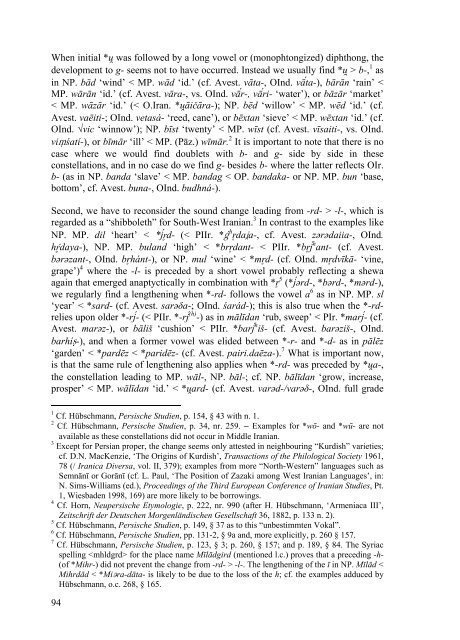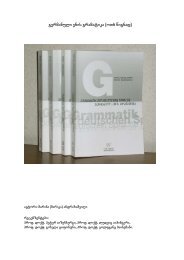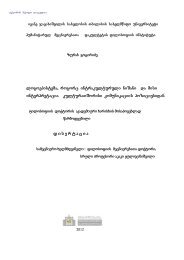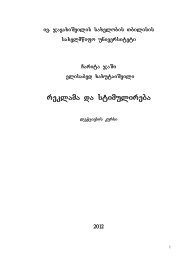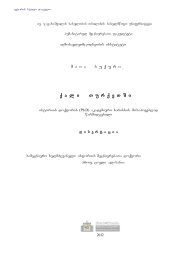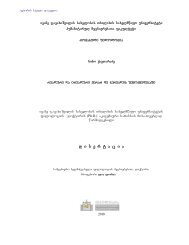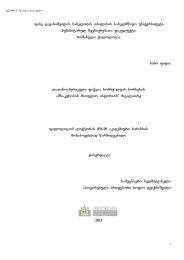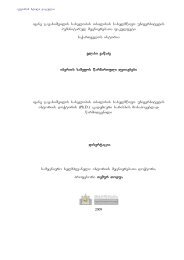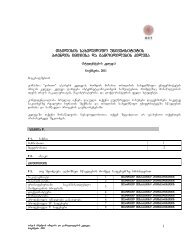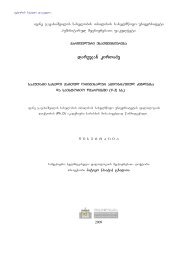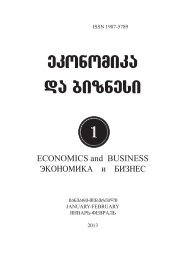issues of linguistics - Tbilisi State University
issues of linguistics - Tbilisi State University
issues of linguistics - Tbilisi State University
Create successful ePaper yourself
Turn your PDF publications into a flip-book with our unique Google optimized e-Paper software.
When initial *u» was followed by a long vowel or (monophtongized) diphthong, the<br />
development to g- seems not to have occurred. Instead we usually find *u» > b-, 1 as<br />
in NP. bād ‘wind’ < MP. wād ‘id.’ (cf. Avest. vāta-, OInd. vā́ta-), bārān ‘rain’ <<br />
MP. wārān ‘id.’ (cf. Avest. vāra-, vs. OInd. vā́r-, vā́ri- ‘water’), or bāzār ‘market’<br />
< MP. wāzār ‘id.’ (< O.Iran. *u»āičāra-); NP. bēd ‘willow’ < MP. wēd ‘id.’ (cf.<br />
Avest. vaēiti-; OInd. vetasá- ‘reed, cane’), or bēxtan ‘sieve’ < MP. wēxtan ‘id.’ (cf.<br />
OInd. √vic ‘winnow’); NP. bīst ‘twenty’ < MP. wīst (cf. Avest. vīsaiti-, vs. OInd.<br />
viÔśatí-), or bīmār ‘ill’ < MP. (Pāz.) wīmār. 2 It is important to note that there is no<br />
case where we would find doublets with b- and g- side by side in these<br />
constellations, and in no case do we find g- besides b- where the latter reflects OIr.<br />
b- (as in NP. banda ‘slave’ < MP. bandag < OP. bandaka- or NP. MP. bun ‘base,<br />
bottom’, cf. Avest. buna-, OInd. budhná-).<br />
Second, we have to reconsider the sound change leading from -rd- > -l-, which is<br />
regarded as a “shibboleth” for South-West Iranian. 3 In contrast to the examples like<br />
NP. MP. dil ‘heart’ < *j́r8d- (< PIIr. *ã h r8daa-, cf. Avest. zərədaiia-, OInd.<br />
hrÛ8daya-), NP. MP. buland ‘high’ < *brr8dant- < PIIr. *br8j́ h ant- (cf. Avest.<br />
bərəzant-, OInd. br8hánt-), or NP. mul ‘wine’ < *mr8d- (cf. OInd. mr8dvīkā- ‘vine,<br />
grape’) 4 where the -l- is preceded by a short vowel probably reflecting a shewa<br />
again that emerged anaptyctically in combination with *r8 5 (*j́ərd-, *bərd-, *mərd-),<br />
we regularly find a lengthening when *-rd- follows the vowel a 6 as in NP. MP. sl<br />
‘year’ < *sard- (cf. Avest. sarəδa-; OInd. śarád-); this is also true when the *-rd-<br />
relies upon older *-rj́- (< PIIr. *-rj́ (h) -) as in mālīdan ‘rub, sweep’ < PIr. *marj́- (cf.<br />
Avest. marəz-), or bāliš ‘cushion’ < PIIr. *barj́ h iš- (cf. Avest. barəziš-, OInd.<br />
barhíó-), and when a former vowel was elided between *-r- and *-d- as in pālēz<br />
‘garden’ < *pardēz < *paridēz- (cf. Avest. pairi.daēza-). 7 What is important now,<br />
is that the same rule <strong>of</strong> lengthening also applies when *-rd- was preceded by *u»a-,<br />
the constellation leading to MP. wāl-, NP. bāl-; cf. NP. bālīdan ‘grow, increase,<br />
prosper’ < MP. wālīdan ‘id.’ < *u»ard- (cf. Avest. varəd-/varəδ-, OInd. full grade<br />
1 Cf. Hübschmann, Persische Studien, p. 154, § 43 with n. 1.<br />
2 Cf. Hübschmann, Persische Studien, p. 34, nr. 259. _ Examples for *wō- and *wū- are not<br />
available as these constellations did not occur in Middle Iranian.<br />
3 Except for Persian proper, the change seems only attested in neighbouring “Kurdish” varieties;<br />
cf. D.N. MacKenzie, ‘The Origins <strong>of</strong> Kurdish’, Transactions <strong>of</strong> the Philological Society 1961,<br />
78 (/ Iranica Diversa, vol. II, 379); examples from more “North-Western” languages such as<br />
Semnānī or Gorānī (cf. L. Paul, ‘The Position <strong>of</strong> Zazaki among West Iranian Languages’, in:<br />
N. Sims-Williams (ed.), Proceedings <strong>of</strong> the Third European Conference <strong>of</strong> Iranian Studies, Pt.<br />
1, Wiesbaden 1998, 169) are more likely to be borrowings.<br />
4 Cf. Horn, Neupersische Etymologie, p. 222, nr. 990 (after H. Hübschmann, ‘Armeniaca III’,<br />
Zeitschrift der Deutschen Morgenländischen Gesellschaft 36, 1882, p. 133 n. 2).<br />
5 Cf. Hübschmann, Persische Studien, p. 149, § 37 as to this “unbestimmten Vokal”.<br />
6 Cf. Hübschmann, Persische Studien, pp. 131-2, § 9a and, more explicitly, p. 260 § 157.<br />
7 Cf. Hübschmann, Persische Studien, p. 123, § 3; p. 260, § 157; and p. 189, § 84. The Syriac<br />
spelling for the place name Mīlādgird (mentioned l.c.) proves that a preceding -h-<br />
(<strong>of</strong> *Mihr-) did not prevent the change from -rd- > -l-. The lengthening <strong>of</strong> the ī in NP. Mīlād <<br />
Mihrdād < *Mira-dāta- is likely to be due to the loss <strong>of</strong> the h; cf. the examples adduced by<br />
Hübschmann, o.c. 268, § 165.<br />
94


